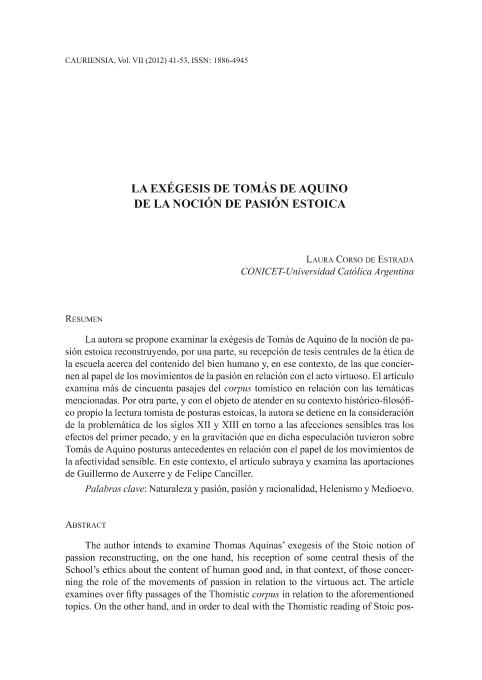Mostrar el registro sencillo del ítem
dc.contributor.author
Corso, Laura Estela

dc.date.available
2023-04-18T20:10:05Z
dc.date.issued
2012-01
dc.identifier.citation
Corso, Laura Estela; La exégesis de Tomás de Aquino de la noción de pasión estoica; Universidad de Extremadura; Cauriensia; 7; 1-2012; 41-53
dc.identifier.issn
1886-4945
dc.identifier.uri
http://hdl.handle.net/11336/194422
dc.description.abstract
La autora se propone examinar la exégesis de Tomás de Aquino de la noción de pasión estoica reconstruyendo, por una parte, su recepción de tesis centrales de la ética de la escuela acerca del contenido del bien humano y, en ese contexto, de las que conciernen al papel de los movimientos de la pasión en relación con el acto virtuoso. El artículo examina más de cincuenta pasajes del corpus tomístico en relación con las temáticas mencionadas. Por otra parte, y con el objeto de atender en su contexto histórico-filosófico propio la lectura tomista de posturas estoicas, la autora se detiene en la consideración de la problemática de los siglos XII y XIII en torno a las afecciones sensibles tras los efectos del primer pecado, y en la gravitación que en dicha especulación tuvieron sobre Tomás de Aquino posturas antecedentes en relación con el papel de los movimientos de la afectividad sensible. En este contexto, el artículo subraya y examina las aportaciones de Guillermo de Auxerre y de Felipe Canciller.
dc.description.abstract
The author intends to examine Thomas Aquinas’ exegesis of the Stoic notion of passion reconstructing, on the one hand, his reception of some central thesis of the School’s ethics about the content of human good and, in that context, of those concerning the role of the movements of passion in relation to the virtuous act. The article examines over fifty passages of the Thomistic corpus in relation to the aforementioned topics. On the other hand, and in order to deal with the Thomistic reading of Stoic postures within its historical-philosophical context, the author dwells on the consideration of the problem of the XIIth and the XIIIth centuries around sensible affections after the effects of original sin, as well as on the influence that former postures relating to the role of the movementes of sensible affectivity have had over Thomas Aquinas on such speculation. In this context, the article stresses and examines William of Auxerre’s and Philip the Chancellor’s contributions.
dc.format
application/pdf
dc.language.iso
spa
dc.publisher
Universidad de Extremadura
dc.rights
info:eu-repo/semantics/openAccess
dc.rights.uri
https://creativecommons.org/licenses/by-nc-sa/2.5/ar/
dc.subject
NATURALEZA
dc.subject
PASIÓN
dc.subject
RACIONALIDAD
dc.subject
ESTOICISMO Y MEDIOEVO
dc.subject.classification
Ética

dc.subject.classification
Filosofía, Ética y Religión

dc.subject.classification
HUMANIDADES

dc.title
La exégesis de Tomás de Aquino de la noción de pasión estoica
dc.type
info:eu-repo/semantics/article
dc.type
info:ar-repo/semantics/artículo
dc.type
info:eu-repo/semantics/publishedVersion
dc.date.updated
2023-04-18T13:16:50Z
dc.journal.volume
7
dc.journal.pagination
41-53
dc.journal.pais
España

dc.journal.ciudad
Cáceres
dc.description.fil
Fil: Corso, Laura Estela. Pontificia Universidad Católica Argentina "Santa María de los Buenos Aires"; Argentina. Consejo Nacional de Investigaciones Científicas y Técnicas; Argentina
dc.journal.title
Cauriensia
dc.relation.alternativeid
info:eu-repo/semantics/altIdentifier/url/https://dialnet.unirioja.es/servlet/articulo?codigo=4180036
Archivos asociados
